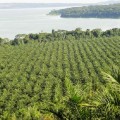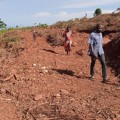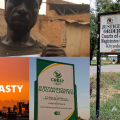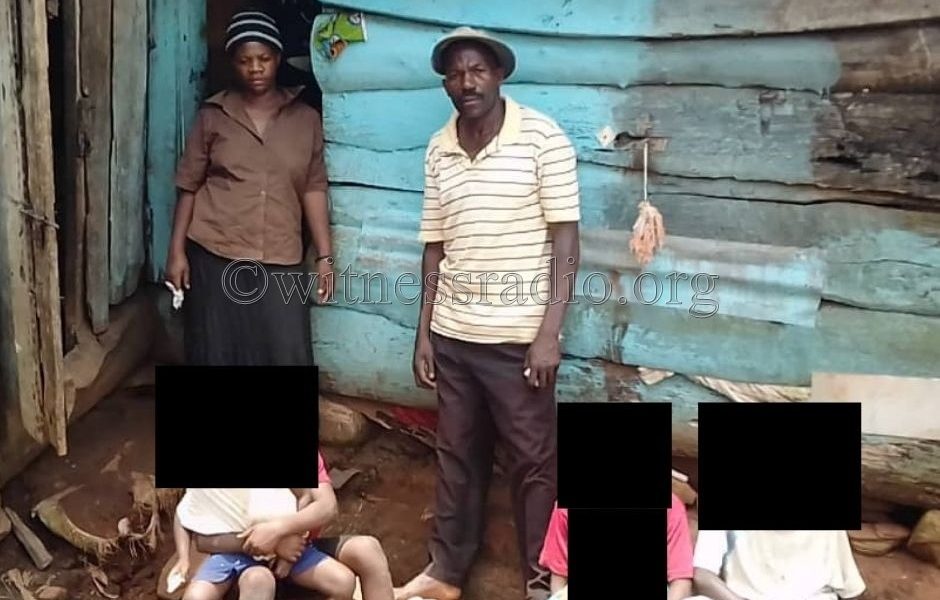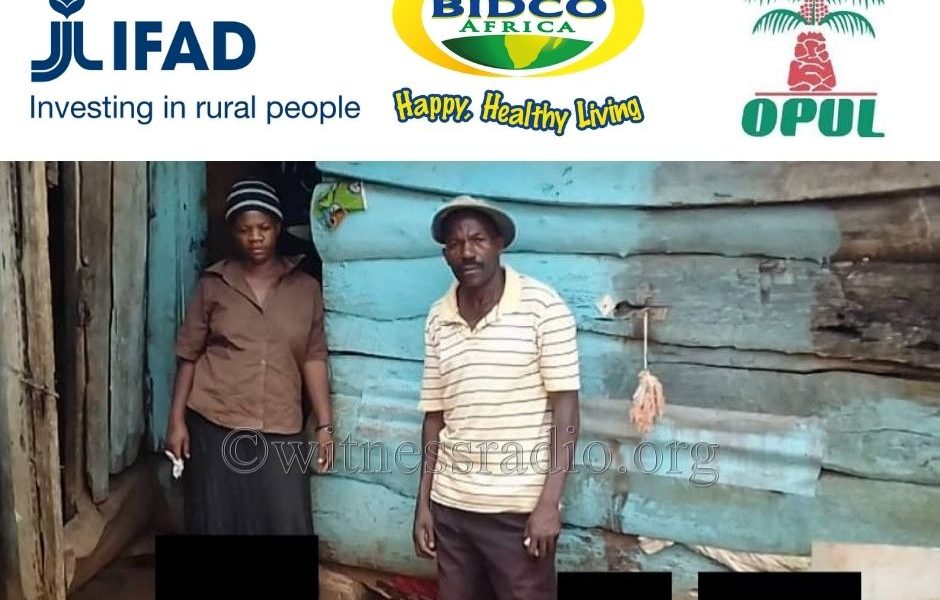Ssalongo Jjuko and his family in front of their wooden house in Kalangala district.
By witnessradio.org Team
Kalangala – Uganda – Sometime in 2011, the crows of cocks and the sweet sound of the Great Blue Turaco that once reminded the residents of Kyabwima village, Mugoye Sub County in Kalangala district of their calling-agriculture, were unusually adulterated. They initially ignored it, but on stepping their feet out of the households, it dawned on them that it was not something they would wish away like the frightening Bogeyman story that was passed down to hundreds of generations by their ancestors to assist them in making a good choice.
Little did they know, that violent eviction was the common global trait the UN’s International Fund for Agricultural Development (IFAD) backed oil-palm projects announced their arrival. “From the Soil to the Pan” is the catchy philosophy for Bidco-Uganda, a beneficiary of the cut-throat financing by the IFAD Oil Palm Plantations.
Whereas the financiers, IFAD, are fronting food security as the “ideal” they intend to achieve, the “targeted beneficiaries” are wallowing in poverty. The evictees who lost acres of land to a multi-national in an inhumane eviction, hold a different view. To them, the project is a Trojan horse for the primitive accumulation of capital – that has left them landless, hungry, and homeless. The eviction is still fresh in their minds.
“We woke up in the morning seeing graders putting down every structure, all our plantations and we were told to vacate the place. We had nowhere to go and neither were we compensated.” Ssalongo Jjuuko recounts.
This would be the ideal time for Ssalongo and Nalongo Jjuuko to attend to their farm which they had cultivated for more than 10 years. On the flip side, the former smallholder farmer and the rest of the family are now spectators in the second season of their traditional agricultural calendar. The past month, “Kasumbula” (July) which means to clear the land, is a month in Buganda’s agricultural calendar, has gone to waste.
They cannot come to terms with the fact that they being landless is the reason why they didn’t clear any gardens in preparation for new planting. The family of 8 (eight) that owned 20 acres of farmland and thrived on farming are now caretakers of a 100×100 Ft (A hundred by a hundred feet) offered to them by a good Samaritan in Kasenyi village, a fishing community, as shelter.
The glorious days are now gone but the good memories still linger. The 20 acres piece of land was a gold mine. It comes with certainty but above all food security. Before the eviction. The family grew a variety of food crops. The harvests blessed them with maize, cassava, beans, bananas, and avocados for consumption, and even the luxury to sell.
It should be remembered that following an agreement signed between the Government of Uganda and BIDCO, to increase palm oil production in the country leading to the birth of Oil Palm Uganda Limited (OPUL) was launched in 2002.
Bidco Uganda is a joint venture formed between Wilmar International, Josovina Commodities, and Bidco Oil Refineries, a Kenya-based company. The project is financed by both the government of Uganda and the IFAD. According to the available information, the project also received $12 million in financing from the Government of Uganda and $20 million from IFAD
In 2011, OPUL acquired land leases from a Ugandan businessman, Amos Ssempa, intending to expand its plantations. About 7,500 hectares (18,500 acres) of oil palm have been planted since 2002. OPUL describes the project as part of an initiative to increase vegetable oil production in the country.
According to the residents, their Land Lord Mr. Amos Sempa leased land without their consent. They claim he had a hand in their eviction which allegations he denies. “Yes they were evicted but they have to deal with the company (Bidco- Africa) not me,” he said in an interview with Witness Radio – Uganda research team.
In 2015, the company begrudgingly offered peanuts as compensation. “Just imagine for 20 acres I owned, the company was paying me Uganda Shillings three (3) millions (USD 883), my fellow villagers and I refused to take the little money,” he narrates.
However, when they piled more pressure on it, the multinational adopted the carrot and stick approach. It promised to compensate but set unfair conditions. They had to vacate their land before the compensation and had to either accept peanuts offered or forget everything about it. Some of them stormed their offices to convey their dissatisfaction.
A meeting was called, and in the meeting, the company undertook to re-compensate them in three months but all in vain. “They told us to only wait for three months that the amounts would be raised and deposited back on our accounts but up to now I have never seen any,” he painfully recounts.
Since 2011 when they were evicted, his family has never been compensated and its state is worrying. On the other end, and in all its efforts to justify this as a magic bullet to food sovereignty, the renegade to food sovereignty, IFAD, uses glowing language to justify its blind-financing of agri-business.
“We are working to increase the incomes of rural households living in poverty, along with improving their food security and reducing their vulnerability.” Reads part of its statement on an oil-palm project.
On the contrary, the family is starving, and cannot afford what to eat, children do not attend school, medication is also a problem, and provision of all other necessities is a distant dream.
“We eat once in a day, and it is hard to get it, we have no work to do,” Nalongo Jjuuko opens up on their ordeal.
Salongo and Nalongo JJuko who earned more than 3 Million Uganda Shillings (834 US Dollars) from their produce in one season now resorted to collecting palm leaves, crumbs of the IFAD project, which they dry and turn into brooms.
These palm leaves whose broom costs one thousand Uganda shillings do not come on a silver platter. There is a price to pay for them. They have to be on guard against possible arrests. “You have to time when the workers in the plantations are not there because when they find you, they arrest you and then make money out of you. So you can spend a whole day on a lookout to see if no one is there. On a good day you can earn yourself 2000 to 5000 shillings, about 0.55 to 1.37 dollars,” a struggling Nalongo Jjuuko revealed.
The story of Ssalongo Jjuuko is not different from that of over 100 similar families, similar in Kyabwima village Kalangala district that were evicted to pave way for the palm growing project but failed to move on with the new life.
The families that could feed their families, educate their children and provide all other necessary needs now cannot sustain themselves.
Residents add that they have not received any benefit, which is worth celebrating, from the project. Instead, they are living miserable lives and grappling with malnutrition diseases due to scarcity of food.
“Most of us have failed to secure alternative land for settlement and food production, those that got where to stay, have nowhere to practice farming,” Nalongo Nakirya Dorothy a mother of 7 (seven) paints a picture of the far-reaching effects of the project.
The former RDC of Kalangala district, Mr. Daniel Kikoola, says that the available information proves that residents in his area have not benefited from the project
“People who had enough food and even could sell off some have been reduced to beggars in their own country yet the oil palm giants are making profits, this is wrong and the government must stop it,” Mr. Kikoola explains with a crestfallen tone.
The scarcity of food has also spiked food-related theft on the island. The Local Council One, Vice-Chairman Kasenyi village, Mrs. Namutebi Vicky, says that food theft in her area has increased. “About 8-10 cases in a month are reported to us,” she shares.
When the Bidco community liaison officer, Mr. Kizito Ssentongo, was contacted he insisted that they paid for everyone’s land. “Their land was valued and paid, those who refused the money should wait.”
That waiting has continued to bite. No one knows, including IFAD, when the poor farmers like Salongo Jjuko will be adequately compensated, and yet everyone, including IFAD, is certain that nothing will stop the “godfather of modern agri-business” (IFAD) from sinking more money because the profitability of these loans is more appealing.
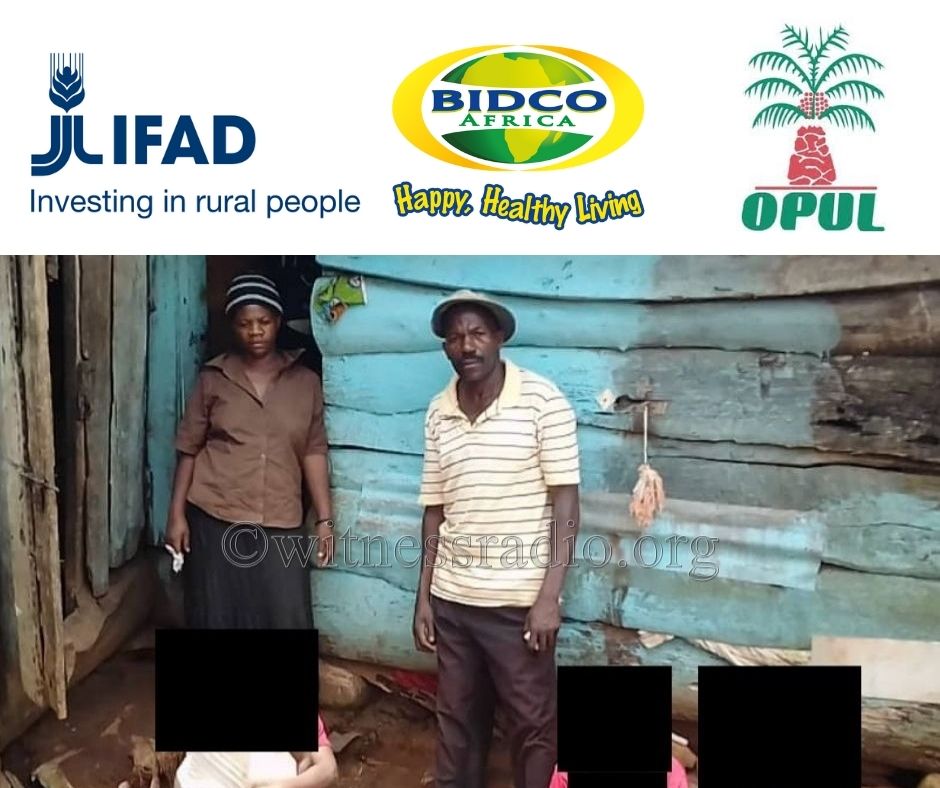
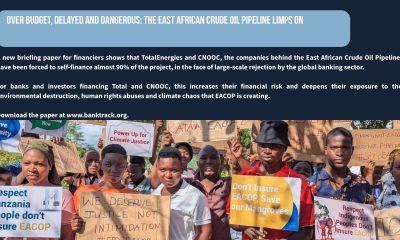
 MEDIA FOR CHANGE NETWORK2 weeks ago
MEDIA FOR CHANGE NETWORK2 weeks ago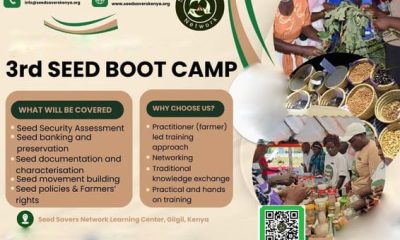
 MEDIA FOR CHANGE NETWORK1 week ago
MEDIA FOR CHANGE NETWORK1 week ago
 MEDIA FOR CHANGE NETWORK2 weeks ago
MEDIA FOR CHANGE NETWORK2 weeks ago
 MEDIA FOR CHANGE NETWORK4 days ago
MEDIA FOR CHANGE NETWORK4 days ago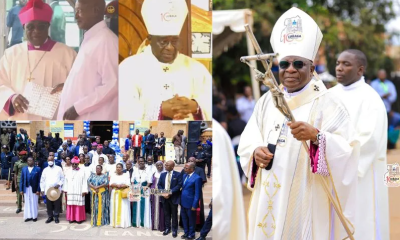
 MEDIA FOR CHANGE NETWORK2 weeks ago
MEDIA FOR CHANGE NETWORK2 weeks ago
 SPECIAL REPORTS AND PROJECTS4 days ago
SPECIAL REPORTS AND PROJECTS4 days ago
 SPECIAL REPORTS AND PROJECTS4 days ago
SPECIAL REPORTS AND PROJECTS4 days ago
 MEDIA FOR CHANGE NETWORK2 days ago
MEDIA FOR CHANGE NETWORK2 days ago
